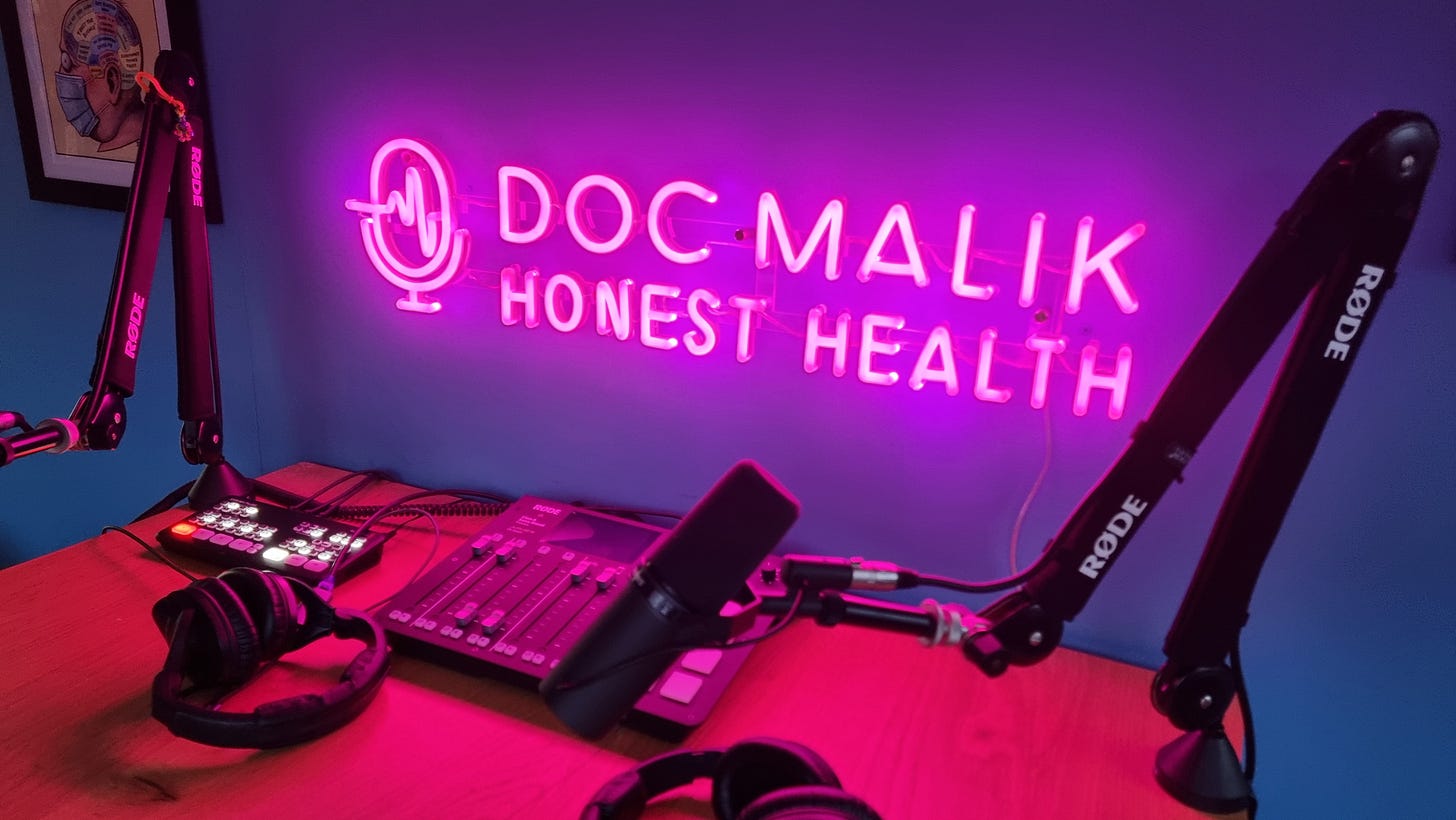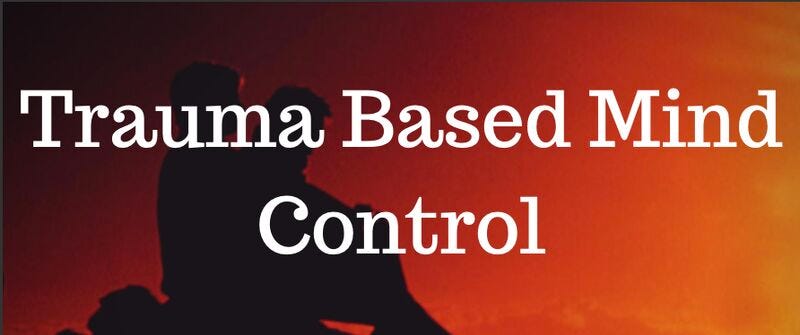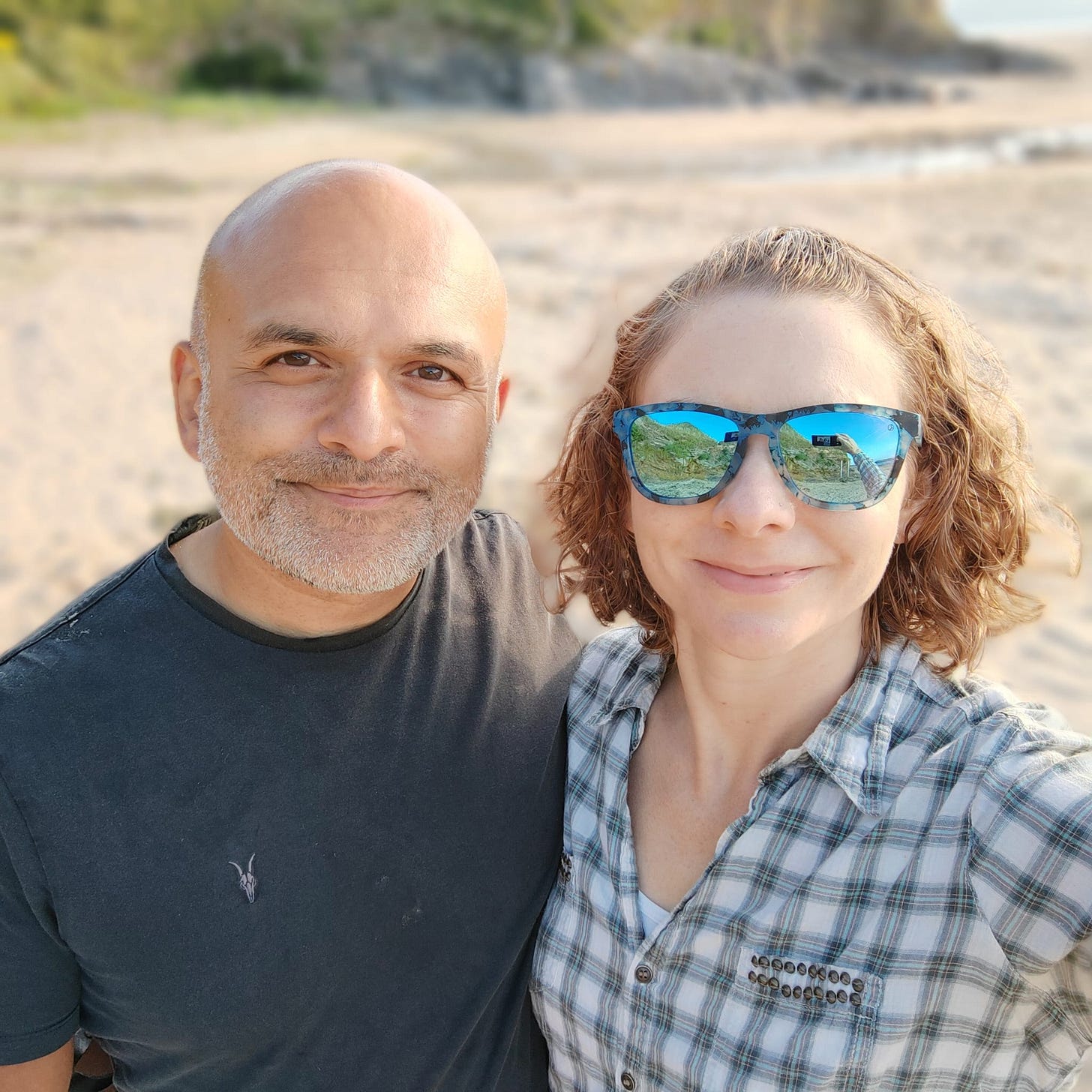WARNING
THIS PODCAST IS HIGHLY ADDICTIVE AND SERIOUSLY GOOD FOR YOUR HEALTH
HEALTH - FREEDOM - HAPPINESS
SUPPORT DOC MALIK HONEST HEALTH - BECOME A PAID MEMBER TODAY
Zero Corporate Sponsors - 100% supported by the People - Working For The People
The UK’s Best and Worlds Number One Freedom Fighting Podcast
Thank you to all the new subscribers for your lovely messages and reviews! And a big thanks to my existing subscribers for sticking with me and continuing to support the show!
It’s a bold claim, isn’t it? The idea that every doctor might have been subjected to trauma-based mind control. But when you unpack the experiences of medical professionals, including my own, it starts to make a bit more sense, not in the sci-fi, shadowy-conspiracy sense, but in terms of the intense pressures and conditioning that come with the territory of becoming and being a doctor.
Trauma-based mind control is a concept that describes how intense psychological and emotional stress can be used to condition individuals into compliance, suppress critical thinking, and enforce obedience. It’s often associated with extreme or manipulative systems, but when we look at the structures around medical training and practice, parallels start to emerge.
It begins before Day 1 of Medical school. From the moment someone decides to become a doctor, they step into an environment of relentless demands that profoundly shape them. For example, intense studying and dedication are required to get good grades. And then the application and interview process.
The Gauntlet of Medical Training
Everyone knows medical training is gruelling. We’re talking years of relentless study and sleepless nights. As a medical student, I attended hundreds of lectures, took part in exams every couple of weeks, and had innumerable deadlines. Looking back, I don’t have particularly fond memories because it was tough!
Every year, we were aware of the dropouts. Those who couldn’t cut it. In other words, didn’t have what it takes to be abused and come back for more. At the time, I pitied them; now, I wonder what they are doing and can’t help but think they were the smart ones. The class was competitive; we all wanted to be the best, and it felt like we were in a race where coming last was simply not an option.
The finals year is when the bubbling stress climaxes with the Finals exam. Spread over almost 2 months, with written exams, multiple choice questions and face-to-face vivas. Everything is timed, and the pressure is incredible. If you are successful, you leave the frying pan for the baptism of fire, which is the first year as a junior doctor. Believe it or not, nothing I was taught in my 5 years as a medical student prepared me for my first job as a junior doctor. We weren’t taught what to expect and what our duties would be. You just get thrown in the deep end and are expected to swim. I remember my first day at work on a surgical rotation. When I asked the consultant what I was expected to do at the Breast Clinic, his response was, “You will either figure things out, or you won’t; you will either sink or swim, now I’ve got work to do” and shut the door on my face. And this wasn’t an isolated case, I had a professor once say to me, “You won’t see me teach you anything in the next 6 months, but you will learn”.
The culture was harsh. Bullying from senior doctors was common. We were stripped of autonomy and reshaped into compliant professionals, similar to how military recruits endure gruelling training to become aligned with their mission. Just like soldiers, we were broken down to be rebuilt, this time into "perfect" medical practitioners.
Army recruits endure gruelling training designed to push them to their physical and mental limits. This intense process is not just about building resilience or discipline—it also serves as a psychological reset, breaking down individual identities to make recruits more receptive to the military's values, commands, and culture. By stripping away personal autonomy and creating a highly controlled environment, this training leaves recruits in a malleable state, primed to be "programmed" with the behaviours, loyalties, and thought patterns required for military cohesion and effectiveness.
This "breaking and rebuilding" process creates soldiers who are not only physically capable but also psychologically aligned with the mission, even when it involves actions they might otherwise question. While essential for fostering teamwork and obedience under extreme conditions, this method can also lead to long-term challenges, including difficulty reintegrating into civilian life or processing experiences that conflict with their moral values.
The same technique applies to doctors. Our training breaks us down, strips away our personal autonomy and makes us malleable and primed for programming.
Add to that the constant exposure to suffering, pain, and death as you do as a doctor, and you have a recipe for emotional and physical exhaustion. Our training isn’t just tough; it’s conditioning. Sleep deprivation alone can impair critical thinking, and when you combine that with the constant high-stakes decision-making, doctors are trained, consciously or not, to follow protocols and defer to authority without question.
A System That Demands Compliance
The medical world operates within a rigid hierarchy, just like the army. From day one, doctors are taught to respect their superiors and stick to established guidelines. Questioning authority or deviating from the norm? That’s a fast track to trouble. Its insubordination! The result is a culture where compliance often takes precedence over creativity or independent thinking.
The Pharma Connection
It doesn’t help that much of what doctors learn is filtered through a lens heavily influenced by the pharmaceutical industry. From the textbooks they study to the protocols they follow, there’s a big emphasis on drugs and standardised treatments. Alternative or holistic approaches? Those rarely make the cut. This was all by design after the Flexner report was produced. What we see today is 100 years of Rockefeller Medicine.
Trauma and Moral Injury
Doctors are exposed to trauma daily, yet they’re expected to remain calm, efficient, and emotionally detached. I have seen some horrific things in my time as a doctor, both at home and abroad. I was never given any help. Over time, this can desensitise even the most compassionate individuals, conditioning them to prioritise efficiency over empathy. And let’s not forget the immense fear of repercussions, lawsuits, losing one’s license, or being ostracised for stepping out of line.
The term “trauma-based mind control” might sound extreme, but there’s no denying that the medical profession is structured in a way that conditions compliance, limits questioning, and normalises high levels of stress and trauma. There is a reason why doctors suffer such high rates of burnout. Research shows that doctors have among the highest rates of suicide for any profession. Male doctors are about 40% more likely to die by suicide than men in other professions, while Female doctors are at an even greater risk, with rates up to 130% higher than women in other fields.
And then there is the issue of moral injury. Moral injury is the psychological, emotional, or spiritual harm that occurs when a person perpetrates, witnesses, or fails to prevent actions that deeply violate their moral or ethical beliefs. It often arises in situations where someone feels they have betrayed their core values or acted in a way that conflicts with their sense of right and wrong. While moral injury is not classified as a mental illness like PTSD, it can coexist with or contribute to mental health challenges.
I believe that many doctors today are suffering moral injury. They know they are serving a system that does not place the patient first. They know that they are not abiding by medical ethics. They know that “First Do No Harm’ doesn’t refer to the patient any longer but to their medical license, career, reputation and income. They know that they aren’t really helping people get better. They know that the “vaccines” are causing harm. They know that they have been lied to and that they, in turn, have lied but are too scared or ashamed to admit it. They know they hate their job but will never admit it. They know that the way they practice medicine is fundamentally anti-patient and unethical. And this knowledge, without action to address it, eats one up inside. It leads to emotional distress, such as anxiety and depression. It results in disconnection from one’s sense of purpose or community. And it also causes a spiritual crisis or loss of faith in humanity, institutions, or oneself.
It explains why one of my former colleagues told me that the only reason worth living was to drink alcohol every evening. And yes, alcohol and drug addiction are rampant among doctors.
The Way Forward
Addressing these issues requires a complete rethink of how we train and support doctors. We need a system that fosters ethical, patient-centred care over blind compliance. Doctors must be empowered to think critically, challenge harmful norms, and practice medicine with real freedom, without fear of retribution from hospital management and medical licensing and regulatory bodies.
We can only begin to heal the profession and those within it by acknowledging and addressing the trauma inherent in medical training and practice.
Thank you.
Much love, as always.
Ahmad x
Health - Freedom - Happiness
This Is How You Can Support The Doc Malik Show
Subscribe to my paid substack - click here
Subscribe to my paid Spotify episodes - click here
Make a one time donation - Buy me a Coffee
Regular coffee donation - click here
Remember after my cancellation I am wholly reliant on you, my listeners and readers to carry on my work speaking out for YOU and YOUR families.
Your contribution will make a difference.
You can also (Christmas) GIFT a subscription to a friend or family member - click here
Affiliates
As the number of paid subscribers grows slowly and gradually, I’ve had to find other ways to augment my income. I am only recommending products that I and my family already use.
Waterpure
We distil all our water for drinking, washing fruit and vegetables, and cooking. If you knew what was in tap water, so would you!
Use my code, www.waterpure.co.uk/docmalik and I get £20 for every distiler sold. CLICK HERE to visit website and view products. Just click the link and any purchase will be tagged to my affiliate code.
Make sure to put electrolytes back in your water. We use Hunter & Gather (see code below).
Hunter & Gather
Seed oils are inflammatory, toxic and nasty; eliminate them from your diet immediately.
If you want to pursue a keto or carnivore diet and avoid seed oils then I can’t recommend their products enough. Check out there website
https://hunterandgatherfoods.com/?ref=DOCHG
to see what they offer.
Use DOCHG to get 10% OFF your purchase (so buy a ton load)
I get 10% on all sales, so please buy a lot (hee hee).
MERCHANDISE
You also have 10% off all my merch using the code - DOCMALIKSUPPORTER
Doc Malik Honest Health is a reader-listener supported publication. To support my work, and help fight back against the evil bastards, upgrade to Paid and join the clan of freedom loving dissidents! (please)
To all the new subscribers welcome to the Clan!
Please make sure to check your emails download the Substack app so that you can join the chat function.
And oh yeah thank you for the coffee folks x
I hope you enjoy this episode.
YOU ARE BEAUTIFUL AND AWESOME
Much love Ahmad
Disclaimer
I Ahmad Malik: am a private civilian, protected by the Geneva Convention.
My substack, social media posts and podcasts are my personal experiences, observations and opinions. This information is for educational purposes only. Although I am a doctor, I am not your doctor, and I am not providing medical or legal advice to you or to the wider public. I am not licensed or registered with the GMC or any other licensing board.
The responsibility for the interpretation, due diligence and use of the information from my substack and my podcast lies with you, the viewer and/or listener. Please do your research, and use your discernment.
It is not my intention to harass, intimidate, offend, defame, conspire, blackmail, coerce or cause anxiety, alarm or distress to any man or woman, and the information presented here is done so with peaceful and honourable intentions.
Ps. please if you can, leave a nice review on Spotify or Apple podcast - Thank you x















I completely agree with everything you said. I qualified in 1992, became a GP as quickly as I could to escape the bullying of hospital work, and then gave up in 2002 using the excuse of having 3 children. The hardest thing I’ve ever done is manage to keep turning up for work every day of my general medical, teaching hospital, house officer job. I couldn’t believe the bullying and couldn’t understand how every, supposedly brilliant, doctor put up with being treated like this. And why was it necessary? Just because our superiors had been bullied, they had to pass it down to us? I used to fantasise that perhaps I should commit a crime, because then I could go to prison and then I’d get sleep every night, regular meals, and I didn’t think the bullying could be worse!
I hated every day of my working life and would cry the night before, often. I had friends that would throw up every morning before they were ‘on take’ as SHOs or registrars. I did have some nice Consultants, but I remember at the DGH we had 6 obs & gynae consultants and only 5 SHOs. The point was that one consultant thought us juniors to be so useless that he didn’t need one and he would use midwives in our place. This was fine unless you happened to be assigned to his ‘take’. I remember admitting a patient, doing all the tests and starting the antibiotics ( as I’d been taught by other nicer consultants) and when I told him about it, he launched it a tirade of abuse, shouting at me in front of the whole ward, all the nurses and the patients in the 6 bed bay, that ‘how dare I start treatment’ (remember others would shout at you for not starting treatment) and reduced me to red faced, tears pouring down my face, wreck. He was also an examiner for the DRCOG which I sat (annd passed), and had written a textbook.
There was an ophthalmologist who I worked for as a joint ENT & ophthalmology SHO in the DGH. One evening I saw a man from the nearby RAF base who was quite high ranking, but presumably had children my age as he stood up for me! I told him I was ENT doctor just covering ophthalmology, so I could examine his eye but then I would need to call the consultant on call, which I did. The consultant didn’t rush back in so I apologised to the man for the wait and said I had called the consultant. When he finally turned up he examined the man and said he clearly had uveitis and couldn’t I see it. I looked through the slit lamp and couldn’t see what he was describing (maybe because I wear contact lenses and my vision isn’t perfect, so it might not have been in focus - trust me those tiny flecks are hard to see) and he got really cross with me. The man ( in his uniform) spoke up and said ‘it’s not her fault if she can’t see it’ and humbled the consultant. I was forever grateful for that patient.
I knew I had to give up working from my last years in clinical school but felt I couldn’t because ‘what else could I do’, ‘I might as well qualify now I’ve been through so much already’, and ‘I should at least qualify as a GP so I can work half time and maybe I won’t hate it so much’, and ‘after putting up with all this I should at least earn some money from it’!
That makes so much sense to me Doc!
I'd like to see doctors trained on a more practical basis, starting by studying part time and spending time working on hospital wards along side nurses, then gradually working their way up. I'd like to see nutrition and natural health management included in training, as well as lifestyle and environmental factors.
I am completely opted out of the National Harm Service and it's going to take an absolute miracle to make me trust it again.